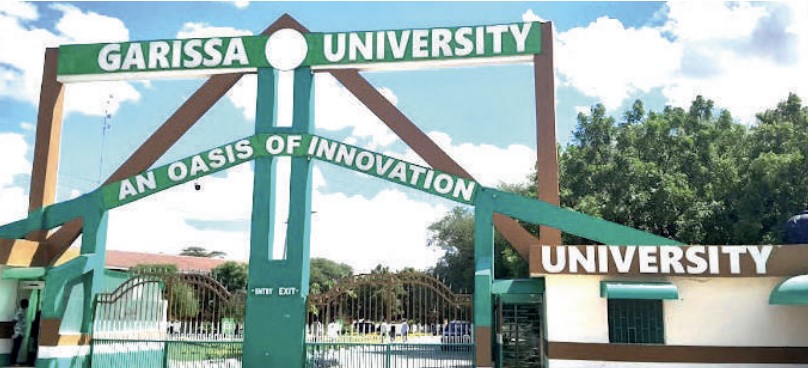
It has been 10 years since terrorists struck
Garissa University and killed at least 148 people, the majority of them
students.
On April 2, 2015, four gunmen stormed Garissa
University and started to shoot randomly, killing 148 people.
It was an attack that shook the world. To security chiefs, terrorism still remains a threat.
They, however, argue they are doing everything possible to address the menace.
Few parts of Kenya, especially the northern part and some in
Lamu are facing incidents of terror-related attacks linked to the al Shabaab
terror group which was responsible for the university massacre.
Several stakeholders in the security sector say they drew lessons from the attack and a number of measures have since then been implemented to address such threats.
For instance, the government has rolled out what they call a multi-agency approach to help in managing any such challenges.
The multi-agency approach in among others
managing the borders in the country is bearing fruit and should be supported,
officials say.
Inspector General of Police Douglas Kanja says since the approach was adopted, different forms of crimes, including terrorism, human trafficking, smuggling, and cross-border crimes, have reduced.
He added there is coordinated sharing of
intelligence among agencies involved in the management, hence a stable country.
Kanja added ongoing multi-agency partnership
which was introduced after a series of terror incidents has stopped major
crimes and sharing of intelligence had enhanced many issues.
“We have had increased consultations,
information sharing and increased utilisation of resources, hence a secure
system,” he said.
He said security agencies have thwarted dozens
of planned terror attacks through the approach.
“Every day should be dedicated to alertness, rejection of divisive rhetoric and safeguarding our community. Together we will defeat these fears,” he said.
A parliamentary committee on security that investigated the Garissa attack incident made a number of proposals that have since been adopted hence better management of crime.
For instance, it said the government should initiate a multi-pronged anti-terrorism and anti-radicalisation strategy involving al stakeholders through the establishment of partnership with the public, religious and elected leaders, community leaders and the media.
This would ensure that the citizenry in the Country particularly North Eastern and Coast regions are actively involved in the fight against terrorism and radicalization.
It recommended that the National Police Service should also decentralize the RECCE Squad operations to County Headquarters, in areas which are vulnerable to terrorist attacks such as the North East Eastern and Coast regions.
“This will reduce the duration taken by the unit to respond to incidents of serious crime in areas far from Nairobi.”
“The government should also initiate a public awareness sensitization programme on safety and evacuation skills, particularly targeting students in all schools and colleges,” the committee said.
The committee further established that Mandera was the preferred transit point used by al Shabaab to transport weapons into the country as indicated by evidence submitted to the committee on the planning and transportation of weapons used in the attack.
"This would be attributed to the large number of al-Shabaab militia along the Kenya /Somali border between Mandera and Elwak."
Refugee camps were reportedly being used by al Shabaab and their sympathisers to plan and launch terror attacks, the team said.
The large population in the camps had also made it difficult for government agencies to determine genuine refugees from suspected militia, the committee said.
Among others, government agencies have been running a deradicalisation programme targeting various groups as part of efforts to address the menace.
A series of activities are lined up to mark the day, officials said adding that the level of vigilance is always higher
After the attack, the Somali-based militia group al-Shabab later said it was motivated to carry out the attack against Kenya because that country sent its troops to Somalia.
That day, in the early hours, heavily armed attackers stormed Garissa University College and shot dead two security guards before opening fire at students.
The gunmen raided the campus, attacking students in their classrooms while they were preparing for exams.
Witnesses said Christians were singled out by
the militants and shot.
More than 500 students managed to escape, some through a fence. Some locked themselves in rooms and cupboards. At least 79 were injured in the attack.
Wearing suicide vests, the four gunmen were
eventually surrounded in a dormitory where the vests detonated and they died.
Out of the 148 people who were killed in the Garissa massacre, 142 were students.
By attacking young, future professionals, the massacre aimed to disrupt the country's socio-economic growth and stability, as well as divide a multi-faith country, analysts say.
Several suspects were later arrested in
connection with the attack.
Three of them were later found guilty of the
attack.
Rashid Charles Mberesero, who was given a life sentence, is a Tanzanian, while the other two men, Mohamed Ali Abikar and Hassan Edin Hassan, are Kenyans.
Mberesero was given the longest term because he was arrested at the scene of the massacre and could not explain his presence, the court heard.
The four gunmen were killed at the scene and the
man who plotted the attack Mohamed Kuno, was killed in a raid in Somalia in
2016.
The prison sentences for two defendants who were convicted in the terror attacks were in 2023 lowered by a court.
High Court Justice Cecilia Githua acquitted
Hassan Edin Hassan and Mohamed Abdi Abikar of the crime of being members of the
al-Shabab militant group, but she upheld the convictions of conspiracy to
commit a terrorist act.
The action lowered their prison sentences from 41 years to 25-and-a-half years.











